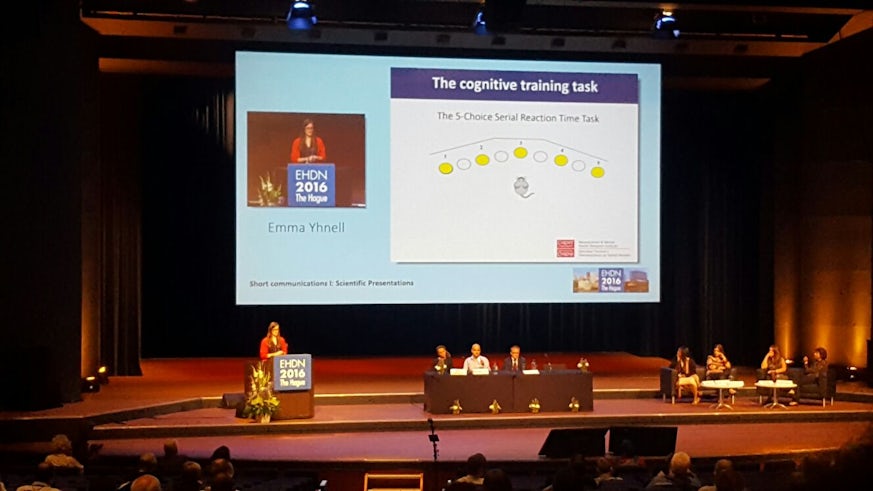The European Huntington’s Disease Network Plenary Meeting 2016
3 Hydref 2016

On the 15 September 2016, over 900 people from 42 different countries met in The Hague for the 9th European Huntington’s Disease Network (EHDN) Plenary Meeting.
The event brought together clinicians, health care professionals, researchers and families affected by Huntington’s disease.
What is Huntington's disease?
Huntington’s disease is a brain disorder which gets progressively worse over time. The disease causes cognitive, psychiatric and movement problems and has no cure, leading to death 10-20 years after diagnosis. The genetic nature of the disease means that if you carry the gene for the disease, there is a 50% chance that you may pass the gene which causes the disease on to your children.
Huntington’s disease research
There were many talks and poster presentations that reflected the range of Huntington’s disease research studies which are currently being undertaken at Cardiff university. These studies include cellular and molecular laboratory work, pharmacological studies, pre-clinical experiments and clinical research.
Brain training
Dr. Emma Yhnell presented her research on brain training using computer games for people with Huntington’s disease. She will be starting a 3-year fellowship in October funded by Health and Care Research Wales based in the Centre for Trials Research and the Neuroscience and Mental Health Research Institute. Cognitive symptoms can vary widely between different patients with Huntington’s disease, therefore Dr. Yhnell will work on a project which explores personalising brain training computer games for people with Huntington’s disease.
Neuropsychiatric tests
There are lots of tests for the motor problems which occur in Huntington’s disease, but there are very few objective tests of the neuropsychiatric symptoms that occur as the disease progresses. Dr Duncan McLauchlan presented his work on developing computerised neuropsychiatric tests of apathy for people with Huntington’s disease.
Transplantation therapies
Professor Anne Rosser, who leads the Cardiff Huntington’s disease research centre, gave a talk which discussed cell transplantation therapies for Huntington’s disease. A specific type of brain cell called medium spiny neurons are lost early within the disease progression and cell transplantation therapies look to specifically replace the medium spiny neurons that are lost. Transplantation studies in Huntington’s disease have so far produced mixed results, so further research is needed to see if this type of therapy is viable for people with Huntington’s disease.
Exercise for Huntington’s disease
In addition to the pharmacological interventions that are being explored for Huntington’s disease the conference focused on physical and exercise therapies for people affected by Huntington’s disease. Professor Monica Busse and Dr Lori Quinn presented evidence that physical activity can benefit people with Huntington’s disease, leading to improvements in their symptoms and quality of life.
The future of Huntington’s disease research
With over 900 delegates in attendance, conference attendees marked the 100-year anniversary of the death of George Huntington, who many credit with first describing Huntington’s disease. There has been a lot of progress in the field of Huntington’s disease research, and the great strength of this conference was the bringing together of clinicians, healthcare professionals, researchers and families affected by Huntington’s disease. This really put the research into context and reminded everyone in attendance why we do the research that we do.
An excellent resource to find out more about Huntington’s disease research, written in plain language, is http://en.hdbuzz.net/. The 9th EHDN Plenary Meeting allowed the Huntington’s disease community to come together and share our knowledge in the international city of peace and justice, The Hague. We left feeling energised and inspired and ready to take our research forward and do whatever we can to continue to help those affected by Huntington’s disease.